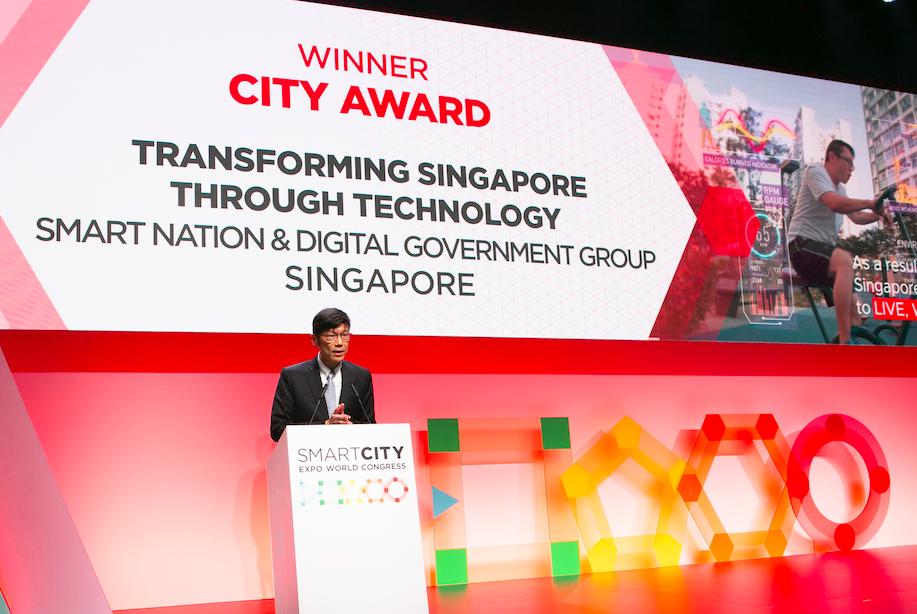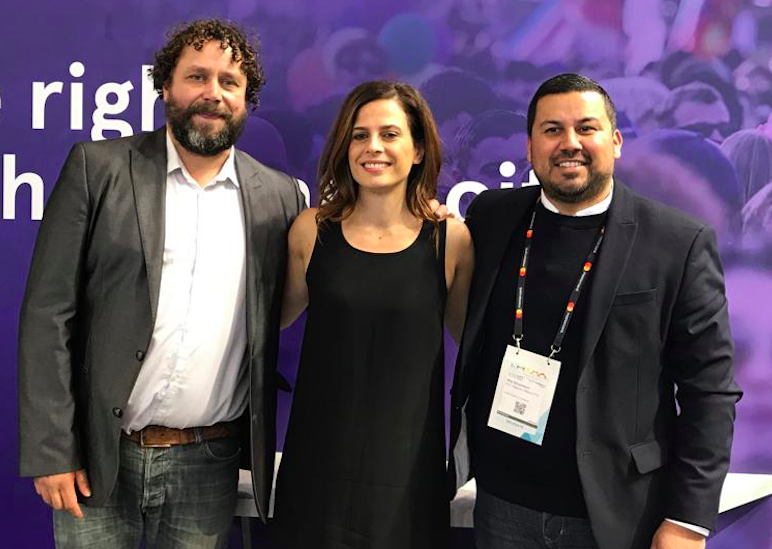
Photo: Screenshot-2018-11-15-at-11.00.04
20-20 Urban Innovation – Member news
29 November 2018
by Folkert Leffring
Singapore wins 2018 Smart City Award

Singapore has won the Smart City 2018 Award for its Smart Nation project at the Smart City Expo World Congress in Barcelona. Previous winners in the city category have included New York and Dubai. The jury recognised the Southeast Asian city-state’s plan led by GovTech to transform itself into a global benchmark of smart urban solutions. Nearly US$15 billion is being invested in research and development in the digital economy, digital government, and digital society, over five years until 2020. The jury–made up of representatives from Barcelona City Council, Smart City Expo World Congress and others–recognised how Singapore has “become a global beacon of urban transformation”. They noted how a major reason for choosing Singapore was for the manner the Smart Nation plan not only enhances the city’s functioning but also improves the services provided to its citizens and “through them their quality of life”.
Californian cities top government innovation ranking
Los Angeles and San Diego have taken first and second place in the 2018 Digital Cities Survey by the Center for Digital Government. The annual survey examines how cities use technology to align with city goals; promote citizen inclusion in government processes and share government data with the public; proactively address citizen expectations; and boost cybersecurity and increase efficiency. The latest rankings place San Diego up one spot from the 2017 report and ahead of major cities including Chicago, Boston and New York City. Los Angeles kept its number one position for the third year in a row. One action San Diego has taken was partnering with Waze to create a free, two-way data-sharing programme that allows the city to share planned road closure information with the company. In return, Waze shares anonymous data from users, allowing the city to make more informed decisions.
New ITU case study maps Moscow’s smart city journey
A new case study from the International Telecommunication Union (ITU) offers an evaluation of Moscow’s progress in meeting the objectives of its ‘smart city’ strategies and the United Nations’ Sustainable Development Goals (SDGs). It was undertaken using the Key Performance Indicators for Smart Sustainable Cities developed by the United for Smart Sustainable Cities initiative. The ITU case study traces Moscow’s smart city journey from its Information City strategy launched in 2011 to its successor the Smart Moscow 2030 strategy, launched this month. The report assesses Moscow’s smart city performance using the ITU’s indicators that measure impact on the economy, environment and society and culture.
San Antonio to gather data from e-scooters
San Antonio’s city council has approved a new pilot programme to regulate dockless e-scooters. Companies like Bird and Lime now need to obtain a permit and pay the city a half-yearly fee of US$10 for each scooter. Companies must also provide proof of liability insurance, among other assurances and pay a US$500 fee before seeking compensation from riders. Pedestrians will have right of way and riders will need to use bike lanes where possible. The mayor, Ron Nirenberg said it was a “light-touch” regulatory framework for modern transport technology that is revolutionising urban mobility. “These common sense rules will improve public safety and enable the city to gather data for enhancing connectivity,” he said. “We will continue to monitor the implementation of dockless vehicles and ensure that last-mile technology is properly integrated into the transportation system.”
CTOs call for digital rights to be made human rights

The chief technology officers of Amsterdam, Barcelona and New York have launched a joint initiative to better protect peoples’ digital rights. The Cities Coalition for Digital Rights consists of five key points that cover universal Internet access; privacy, data protections and security; transparency and accountability; participatory democracy; and open and ethical digital standards. The declaration says that human rights principles such as privacy, freedom of expression, and democracy must be incorporated by design into digital platforms, starting with locally controlled digital infrastructures and services. Francesca Bria, Chief Technology and Digital Innovation Officer, Barcelona, M. Alby Bocanegra, Interim Chief Technology Officer (CTO), New York City and Ger Baron, CTO for Amsterdam, are looking to expand the coalition to 100 cities. “This is a global framework that puts citizens’ rights at the centre of the digital revolution,” Francesca Bria told Cities Today. “The same human rights that people have in their daily life should also apply to a digital world.”
Eight tech firms win funds from London mayor
London’s most innovative tech firms have won the Mayor’s Civic Innovation Challenge. Each has been given £15,000 to jointly test and refine their ideas with a group of public and private sector partners. More than 100 applicants applied in response to seven challenges set out by the mayor, Sadiq Khan, when he launched the contest at this year’s London Tech Week. The challenges are designed to help tackle affordable housing, reducing the harmful effect of dementia, cleaning up the air by promoting electric vehicles and helping people lead healthier, more active lives by increasing their physical activity. The Civic Innovation Challenge was launched in June as part of the mayor’s Smarter London Together roadmap, which sets out how he will realise his ambition for London to become the world’s leading smart city.
Chicago selected to pilot Digital Inclusion project
Chicago will be the first of five cities worldwide to pilot a Smart City Digital Inclusion assessment tool created by G3ict and World Enabled. The tool helps cities evaluate the current state of ICT accessibility and inclusion of persons with disabilities in city digital and smart services. Focused on key functions like communications, procurement, training, and technology standards, it defines key performance indicators and metrics to support advancing accessibility and digital inclusion. The tool’s five levels of maturity for digital inclusion guide cities in assessing and tracking their progress across technology, data, culture, and strategy. Danielle DuMerer, CIO, Chicago, said: “The tool promises to provide a framework that will guide our technology planning efforts with the goal of ensuring that we are developing equitable and inclusive products and services.”
Athens named as European Capital of Innovation
The European Commission has awarded Athens the European Capital of Innovation 2018 with a €1 million prize, funded by the EU research and innovation programme Horizon 2020. The prize money will be used to scale up local innovation activities and collaborate with other cities. The Commission noted how the City of Athens has placed importance to innovation and how it can help the local community bring about change. Some of the innovations promoted include the Digital Council which brings together companies and educational institutions to offer trainings on digital literacy and civic technology trainings as well as promote sustainable innovations like smart recycling bins. The runner-up cities included Aarhus (Denmark), Hamburg (Germany), Leuven (Belgium), Toulouse (France), and Umeå (Sweden) with each receiving €100,000.
Cities join forces to fight cyberattacks
New York will partner with Helsinki, Singapore, Berlin, London, Paris, as well as some countries and venture capital firm Jerusalem Venture Partners to develop and deliver new, affordable, and scalable solutions to protect New York City-based small and midsize business from cyberattacks. The Moonshot Challenge has established a consortium of international partners–all with a shared interest in developing the most innovative and effective cybersecurity solutions. These partners will work with the City of New York to solicit and evaluate proposals from companies and start-ups. Four to eight finalists will receive an award of up to US$20,000 to test their proposal in New York City, structured support to deliver the solution into international markets. Jerusalem Venture Partners has also committed an over US$1 million investment to be awarded to selected proposals, which will help companies accelerate growth in New York City.
Toronto launches app to improve waste sorting and disposal
The Canadian city’s residents can now access collection schedules, search tool and information about where to find drop-off depots and donation centres from their smartphone or tablet with a new app called TOwaste. Residents can search for information on how to properly dispose of more than 2,000 items. The new app also makes it quick and easy to find the nearest location to donate or buy used items or drop off items such as hazardous waste. In addition to providing collection schedules for residents with daytime curbside pickup, the free app will also allows users to set reminders for their collection days and sign up for alerts about service disruptions. The mayor of Toronto, said the new app demonstrates the “city’s commitment to technological innovation and to providing the public with the information they need in quick and easily accessible formats”.






